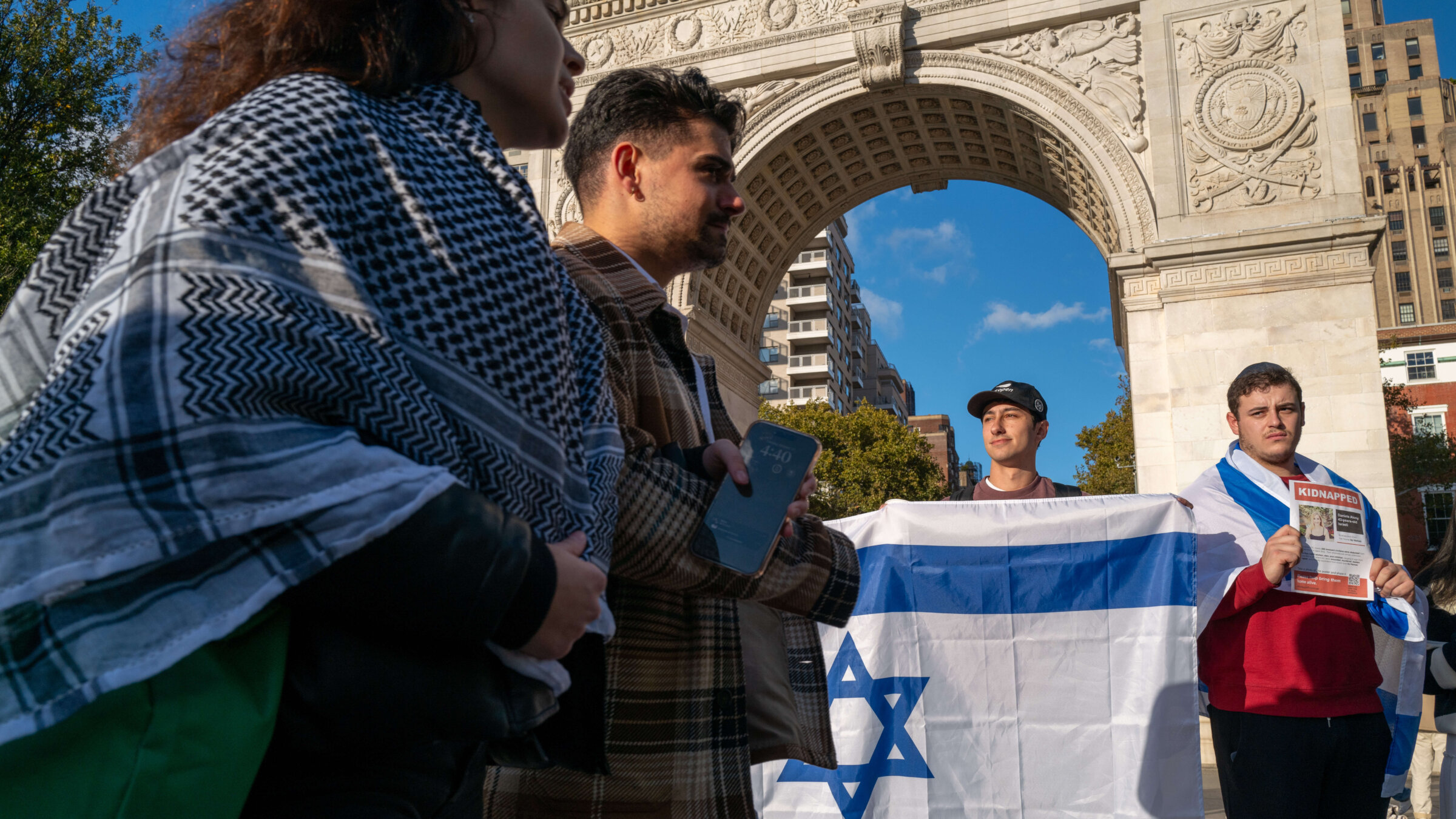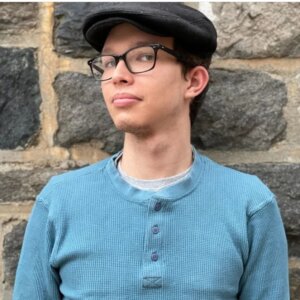My Black and Jewish background has made me uniquely equipped to acknowledge the multiple truths of the Israel-Hamas war
As I watch fellow NYU students take ‘sides,’ I can’t help but feel our society is failing two marginalized peoples

Supporters of both Palestine and Israel face off in dueling protests at Washington Square Park on October 17, 2023 in New York City. Photo by Spencer Platt/Getty Images
Washington Square is not new to protest. In the month following Oct. 7, the park became an apt visual metaphor for the polarized atmosphere on campus as dueling student groups mobilized in response to the ongoing Israel-Hamas war. I would watch protesters gather and hear their chants as I walked to class at New York University. Posters from either side would be put up one day and vandalized the next.
The park is quieter now, the increased police presence and colder weather forcing people to protest elsewhere. But tensions linger. What I have been struggling the most with these last few weeks, both as a student and as an advocate, is how to respond in a way that acknowledges the multiple truths at the center of this crisis.
In the months before the war, I had joined an anti-occupation student movement on my college campus. I came from a progressive multiracial Black-Jewish family where I had not been raised to have any relationship with Israel. But over time, I became more curious. I was simultaneously fascinated and horrified; the progressive vision for Israel conjured by left-wing writers like Amos Oz inspired me. At the same time, I couldn’t ignore the suffering of Palestinians living under a brutal military occupation. When Israeli Prime Minister Benjamin Netanyahu met with President Joe Biden at the U.N. on Sept. 19, I was amongst hundreds of demonstrators protesting his settler-led government for their complete disregard of Palestinian human rights and orchestrating a judicial coup. In the moment, the protests felt life-affirming. Now, they feel like a distant memory.
In the mess that is our public discourse, voices for coexistence and deescalation have been marginalized in order to fulfill simplistic narratives, rather than embrace the much more complex truths at play: That the national ambitions of both Israelis and Palestinians are legitimate and grounded in the legacies of displacement suffered by both peoples. That it is possible to condemn the actions of Hamas and express solidarity with the pain of Israeli families, but also acknowledge how decades of Palestinians living under occupation helped bring us to this devastating moment.
It is imperative that we as a society recognize the historical trauma this war invokes for many people, while also not allowing the memories of the deceased to be used as justification for retaliatory violence against Palestinians and Jews. These truths cannot be separated from each other, but our society is breaking its head trying.
Long before I knew the term “intersectionality,” I was taught to see that injustice doesn’t exist in a vacuum. I grew up in a mixed family; my mother is African American and a Catholic, while my father is a secular Jew whose maternal family is of Ukrainian Jewish descent. From an early age, I was aware of the twin horrors of slavery and the Holocaust. My experience of internalizing my dual ancestral narratives as a Black Jewish person taught me that overcoming oppression requires acknowledging the nuanced experiences of different marginalized peoples. Those of us who want to see a more just and peaceful future where Israelis and Palestinians are able to fulfill their aspirations for self-determination need to recognize one anothers humanity and lived experiences. Our society is abjectly failing to achieve that.
Both on and off campus, I have seen organizations and individuals fail to recognize the complexity. In the immediate aftermath of Oct. 7, I watched in horror as many “progressive” organizations released statements attempting to justify such blatant human rights abuses as “resistance.” Equally frightening has been the willingness of some on the left to deny the experiences of Israeli survivors and refusals to call Hamas a terrorist group. Parallel to this, extremists on the right began spreading inflammatory, racist rhetoric that conflated Palestinian civilians with Hamas. In Congress, conservatives have sought to cut essential humanitarian aid to the West Bank, with one Florida Republican comparing Palestinians to citizens of Nazi Germany.
The toxic environment that has emerged at NYU and other college campuses has been extremely disappointing. There have been incidents in which students have been physically harassed and doxxed online, in what has become an increasingly common cycle of antisemitism, Islamophobia and xenophobia. These responses treat Jewish and Palestinian lives as collateral damage, points to be traded and “scored” in order to fulfill cynical political agendas and disregard the livelihoods at the center of this crisis.
Between the heartbreaking headlines, there have been some inspiring instances of solidarity and community. In Israel, civil society organizations and ordinary people are coming together to grieve and provide support to mixed Jewish-Arab cities in the face of increased extremism. At a high school in New Jersey, students are leading discussions to de-escalate tensions in their communities. Across the board, the message from Palestinian, Israeli and American peace activists is clear — our basic humanity must not be lost in the horror and tragedy of war.
We must recognize that the interests, safety and basic rights of the Israeli and Palestinian peoples are intertwined, and struggle for a solution that guarantees true freedom and self-determination for both peoples. Any effort to dismantle the status quo of occupation, terrorism and morally bankrupt leadership requires that we embrace this fact. The next time I walk by Washington Square, I hope I will see more people who are willing to truly engage with this complexity, and build genuine empathy for the peoples at the center of this conflict.
To contact the author, email [email protected].

















